Welcome to a world illuminated by the power of smart lighting!!!
Imagine stepping into your backyard and being greeted by the warm radiance of an outdoor smart light bulb. It instantly creates an inviting atmosphere, making your outdoor space feel like an extension of your home. Whether you’re hosting a gathering or simply enjoying a quiet evening under the stars, the right lighting can set the perfect mood.
But it doesn’t stop there. The best outdoor string lights can add a touch of magic to any occasion. With their delicate glow and enchanting patterns, they turn ordinary spaces into extraordinary ones. Whether you’re celebrating a special event or simply want to create a cozy ambiance, these string lights are a must-have for any outdoor setting.
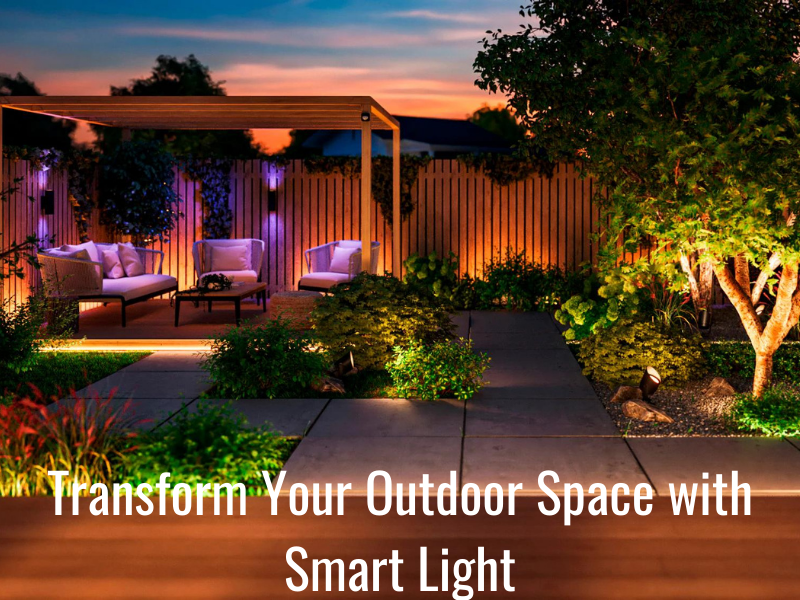
When it comes to the front of our house, choosing the best outdoor light is crucial cause we all want to make a lasting impression. That’s where the best outdoor light for front of house comes in. With its sleek design and powerful illumination, it not only enhances the curb appeal but also provides an added layer of security.
It’s like having a guardian angel watching over your home, keeping it safe and welcoming.
And let’s not forget about the best outdoor LED lights for the house. These energy-efficient marvels not only save you money on your electricity bill but also offer unparalleled brightness and longevity. They illuminate your surroundings with a crisp, clear light that brings out the true beauty of your outdoor space.
In this blog post, we will explore how smart lighting can illuminate our world in ways we never thought possible. From creating captivating outdoor spaces to enhancing our daily lives, we will delve into the endless possibilities that await us. So join me on this journey as we discover the transformative power of outdoor smart lighting and how it can truly illuminate our world, smarter.
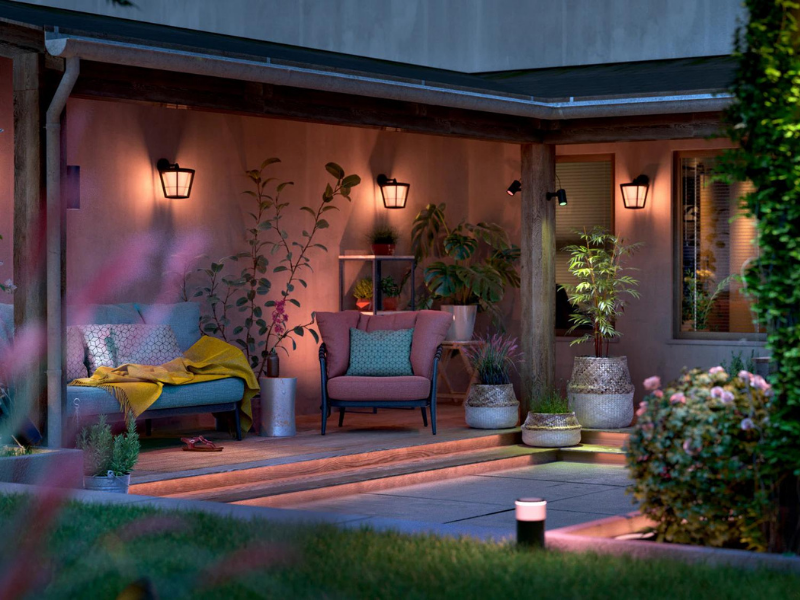
What is Smart Outdoor Lights
Smart outdoor lights are a modern upgrade to traditional outdoor lighting. They offer greater control, flexibility, and convenience compared to their predecessors. Unlike manual switches, smart lights can be controlled remotely using a smartphone app or voice commands. This allows you to easily turn them on and off, adjust their brightness, and even change their color.
Beyond convenience, smart outdoor lights offer several other benefits. They can be programmed to automatically turn on and off based on your schedule, saving you energy and money. Additionally, some smart lights are equipped with motion sensors, allowing them to illuminate your outdoor spaces only when needed.
Besides, the bulbs used in smart outdoor lights are typically LED bulbs that are known for their energy efficiency, long lifespan, and durability, making them ideal for outdoor use.Compared to traditional incandescent bulbs, LED bulbs are significantly more energy-efficient. They consume less power while producing the same amount of light, resulting in lower energy bills. Additionally, LED bulbs have a much longer lifespan than incandescent bulbs, reducing the need for frequent replacements.
The Benefits of Using Smart Outdoor Lights
Outdoor smart lights offer a range of benefits that make them a desirable choice for homeowners, such as:
1. Energy Efficiency
One of the most significant advantages is energy efficiency. Smart lights can be programmed to automatically turn on and off based on your schedule, reducing energy consumption and lowering your utility bills.
2. Convenience
One of the most significant advantages is energy efficiency. Smart lights can be programmed to automatically turn on and off based on your schedule, reducing energy consumption and lowering your utility bills.
3. Security
By setting up motion-activated lights or timers, you can deter intruders and create a safer outdoor environment.
4. Customization
You can personalize your outdoor lighting to match your preferences. You can choose from a variety of colors and dimming options to create the perfect ambiance for your space.
Factors to Consider When Choosing Smart Outdoor Lights
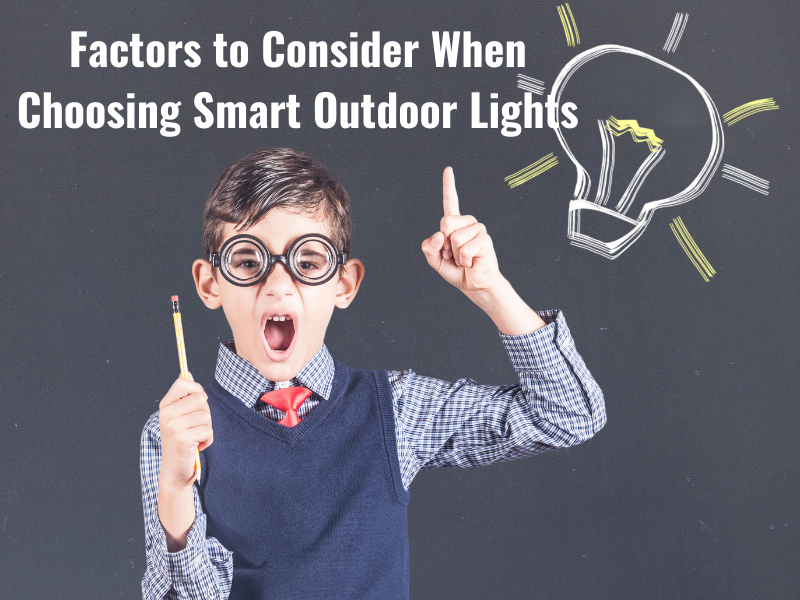
1. Brightness and Color
When selecting outdoor smart lights, it’s crucial to consider both brightness and color to achieve the desired lighting effect.
Brightness is measured in lumens. Higher lumen values indicate brighter lights. For security purposes, floodlights with a high lumen output are ideal. Path lights or string lights typically require lower lumen values for a more ambient glow.
Color temperature is measured in Kelvin (K). Warmer colors, around 2700K, create a cozy and inviting atmosphere. Cooler colors, around 6500K, provide a brighter, more energetic light. Consider the overall ambiance you want to create when choosing a color temperature.
Besides, you can also consider to look for lights that allow you to adjust brightness for different situations, lights that can change color if you want to create various moods or match different décor. Some lights can also be integrated with smart thermostats or security systems for automated lighting scenarios.By carefully considering brightness and color, you can select outdoor smart lights that perfectly complement your outdoor space and meet your specific needs.
2. Weatherproofing
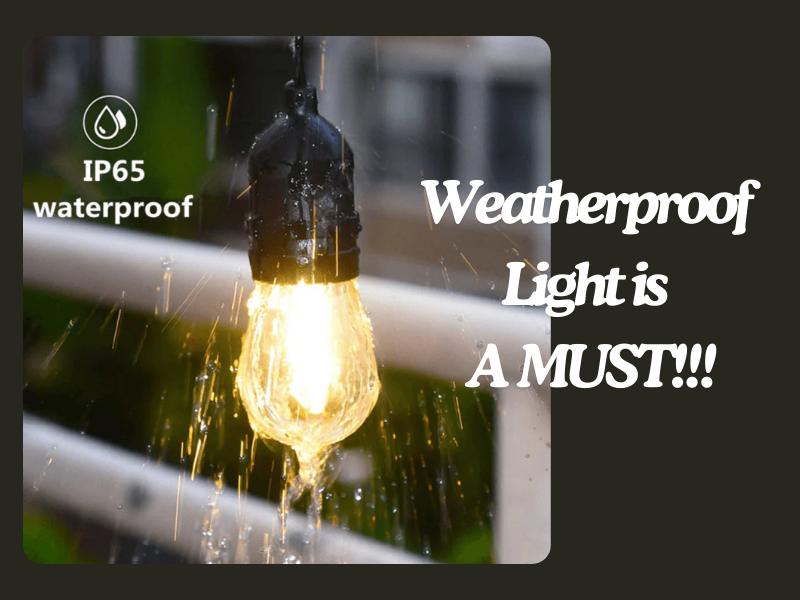
When choosing outdoor smart lights, weatherproofing is a critical factor to consider. Exposure to rain, snow, humidity, and extreme temperatures can significantly impact the lifespan and performance of these devices.
IP ratings are a numerical system used to indicate the level of protection against ingress of solids (dust) and liquids (water). The first digit represents protection against solids, while the second digit indicates protection against liquids. For outdoor smart lights, a minimum IP rating of IP44 is generally recommended, indicating protection against splashing water from all directions.
Beside ensure the lights have a high IP rating to withstand heavy rainfall and humidity, choose lights that can operate in both hot and cold temperatures, especially if you live in a region with extreme weather. You should also consider the wind conditions in your area and select lights with sturdy construction to resist strong winds. Prolonged exposure to sunlight can degrade materials, so look for lights with UV-resistant housings.
3. Connectivity
Connectivity is a crucial factor when choosing outdoor smart lights. The two primary options are Wi-Fi and Bluetooth.
Wi-Fi offers a wider range and can be easily integrated with other Wi-Fi-enabled devices in your home. However, it may require a strong Wi-Fi signal for reliable performance. Meanwhile, Bluetooth typically has a shorter range but is often more energy-efficient, making it suitable for battery-powered lights.
When choosing between Wi-Fi and Bluetooth, you should consider the range of your outdoor space. If your outdoor space is large or has areas with weak Wi-Fi coverage, Bluetooth may not be ideal. If you’re using battery-powered lights, Bluetooth can be a more energy-efficient option. You should also ensure that the lights you choose are compatible with your preferred smart home platform.
4. Compatibility with Smart Home Platforms
Many smart lights are compatible with popular platforms like Amazon Alexa, Google Assistant, Apple HomeKit, and Zigbee. This allows for seamless integration with your existing smart home ecosystem and enables voice control and automation.
5. Power Source
Smart lights can be powered by various sources, each with its own advantages and disadvantages.
Plug-in Wired Smart Lights are the most common light and require a direct connection to a power outlet, providing a consistent and reliable supply of electricity. This makes them ideal for areas with easy access to outlets, such as patios, porches, or near exterior walls. However, their placement is limited by the availability of outlets.
Other than plug-in wired, smart lights nowadays are powered with battery-powered smart lights that are using solar-powered outlet or rechargeable batteries.
Solar-powered outlets are a convenient way to power outdoor smart lights without the need for wiring. They typically have a solar panel that captures sunlight and converts it into electricity, which can then be used to charge batteries or directly power the lights. These outlets are often equipped with a battery backup to ensure continuous power even during cloudy or nighttime conditions. Solar-powered outlets offer a sustainable and eco-friendly solution for powering outdoor smart lights.
Rechargeable batteries for smart lights typically come with a built-in charging port, usually USB-C or micro-USB. You can charge these batteries using a power adapter, computer, or other compatible device. Some smart lights may also include a dedicated charging base or cradle. The charging time for rechargeable batteries can vary depending on the battery capacity and the charging method used. They offer flexibility in placement but may require regular maintenance and recharging.
Several factors to consider when choosing a power source:
- Consider the location where you want to install the smart lights. If you need to place them in areas without easy access to a power outlet, battery-powered options might be more suitable.
- Battery-powered lights may require more frequent maintenance, such as replacing batteries or ensuring they receive adequate sunlight.
- Wired lights are generally more energy-efficient than battery-powered ones, as they don’t rely on batteries that may lose efficiency over time.
- The initial cost and long-term maintenance costs can vary depending on the power source chosen.
6. Additional Features
Beyond the basics features like brightness, color, and connectivity, there are several additional features that can significantly became your consideration to enhance your outdoor smart lighting experience.
- Motion Sensors are a valuable feature in outdoor smart lights, offering enhanced security, convenience, and energy efficiency. These sensors detect movement within their field of view, triggering the lights to turn on automatically.
- Dimming Capabilities allow you to adjust the brightness of your lights to suit different situations. Whether you need bright illumination for security or a softer glow for ambiance, dimming options provide flexibility and control.
- Scheduling features enable you to set timers to turn your lights on and off automatically. This can help save energy, create a welcoming atmosphere, and enhance your outdoor security.
- Integration with other smart home devices can further elevate your outdoor lighting experience. For example, you can create automated routines that turn on your outdoor lights when your security system detects motion or set the lights to a specific color when you arrive home.
7. Installation Ease
Installing smart outdoor lights can be a bit daunting for beginners, but it’s generally not too difficult. The process usually involves mounting the lights, connecting them to a power source (either wired or battery-powered), and setting up the connection to your smart home network. Most manufacturers provide clear instructions and support resources to guide you through the process. However, it’s essential to consider the specific product and your own comfort level.
Factors Affecting Installation Ease:
- Some lights may require more complex wiring than others. Check the manufacturer’s instructions for details.
- Consider the mounting options available for the lights, such as screw-mounting, magnetic mounting, or adhesive mounting.
- Wired lights may require access to an outdoor outlet, while battery-powered lights offer more flexibility in placement.
- If you’re integrating the lights with your existing smart home system, ensure compatibility and follow the provided instructions.
Tips for Easier Installation:
- Carefully review the manufacturer’s instructions before beginning the installation.
- Ensure you have the appropriate tools, such as a screwdriver, drill, and level.
- Select a location for the lights that is accessible and provides adequate coverage.
- After installation, test the lights to ensure they are working correctly and connected to your smart home system.
While the exact installation process may vary depending on the specific product, most outdoor smart lights can be installed with minimal effort. If you’re unsure about your DIY skills, you can always consult a professional electrician for assistance.
Operating outdoor smart lights is quite straightforward once they’re installed. You can typically control them using a smartphone app or voice commands through compatible smart home assistants like Amazon Alexa or Google Assistant. The app will allow you to customize settings, schedule lights, and integrate them with other smart home devices.
8. Cost and Maintenance
By carefully considering the initial and ongoing costs, as well as the potential long-term benefits, you can make an informed decision about whether outdoor smart lights are a worthwhile investment for your home.
Outdoor smart lights come in a wide range of prices, depending on factors such as brand, features, and quantity. While they may have a higher upfront cost compared to traditional outdoor lights, the long-term benefits can outweigh the initial investment.
Battery-powered lights may require regular battery replacement, which can add to the ongoing costs. However, some solar-powered options can minimize these expenses. Wired lights are typically have lower maintenance costs, you may need to replace bulbs or address any wiring issues that arise. Software updates can keep your smart light software updated to ensure optimal performance and security, but this may involve occasional updates or firmware upgrades.
Despite the initial and ongoing costs, outdoor smart lights can offer long-term savings. Their energy-efficient LED bulbs and customizable settings can help reduce your energy consumption and utility bills. Additionally, the security features provided by smart lights can potentially lower your home insurance premiums.
9. Determine your specific needs
Before purchasing outdoor smart lights, it’s essential to assess your specific needs by considering the following factors:
- Identify the areas of your outdoor space you want to illuminate, such as pathways, patios, or security perimeters.
- Determine the desired brightness for different areas. For example, you might need brighter lights for security purposes or a softer glow for ambiance.
- Consider any specific features you require, such as motion sensors, color-changing options, or integration with other smart home devices as they can significantly impact the cost.
- Determine your budget for outdoor lighting and compare prices from different brands and retailers.
- Evaluate the potential long-term savings and benefits of investing in smart lights.
10. Read user reviews
By reading user reviews, you can gain a better understanding of the real-world experience of other customers, even a valuable insight into the strengths, weaknesses, and reliability of a particular product and make an informed decision when selecting outdoor smart lights. Pay attention to feedback on factors like ease of installation, connectivity, and overall satisfaction.
11. Compare multiple products
Don’t rush into a decision. Before making a purchase, it’s essential to compare multiple products to find the best fit for your needs and budget. Consider the following factors:
- Compare the available features, such as brightness, color options, motion sensors, and dimming capabilities.
- Evaluate the cost of different models and consider your budget constraints.
- Research the reputation of the brand and look for customer reviews.
- Ensure the lights are compatible with your existing smart home devices and platforms.
- Check the warranty coverage and terms for each product.
How Do Smart Outdoor Lights Work? Can I Control it Remotely? Can They Be Integrated With Other Smart Home Systems?
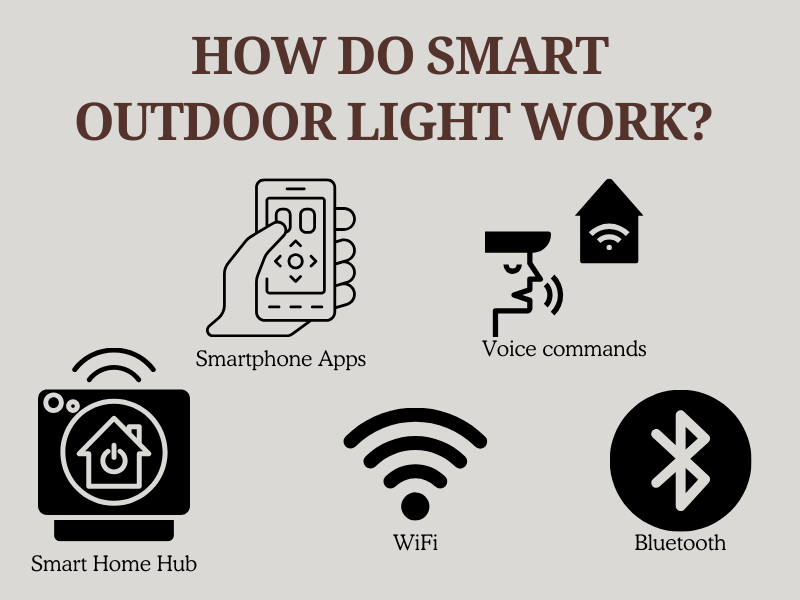
Some smart lights have incorporate sensors, such as motion sensors or light sensors, that can automatically trigger the lights to turn on or off based on specific conditions. This feature can enhance security and energy efficiency. It also offer customizable settings, allowing you to adjust their brightness, color, and scheduling options to suit your preferences.
Smart outdoor lights are also equipped with built-in technology that allows them to connect to your home’s Wi-Fi network or a dedicated smart home system. This connection enables you to control the lights remotely using:
1. Smartphone App
Most smart lights manufacturers provide a dedicated app that you can download to your smartphone or tablet. Through the app, you can turn the lights on and off, adjust their brightness, change their color, and set schedules.
2. Voice commands control
Many smart lights are compatible with popular voice assistant like Zigbee, Thread, Amazon Alexa, Google Assistant, Apple Homekit. This allows you to control your lights using simple voice commands, such as “Turn on the front porch lights.”
Zigbee
Zigbee is a wireless mesh networking protocol that is specifically designed for low-power, low-cost devices. Zigbee can reach greater distances than Wi-Fi or Bluetooth, making it suitable for larger outdoor spaces. It also creates a self-healing mesh network, ensuring reliable connectivity even in areas with weak signals. Zigbee is more energy-efficient than Wi-Fi, making it ideal for battery-powered devices and a standardized protocol, ensuring compatibility with a wide range of devices from different manufacturers.
Thread
Thread is a low-power, low-cost wireless networking protocol that has gained popularity in recent years that is designed to be more energy-efficient and scalable than Zigbee. It’s designed specifically for smart home devices and offers several advantages over traditional Wi-Fi and Bluetooth.
Amazon Alexa
Amazon Alexa offers a convenient way to control your outdoor smart lights using voice commands. When your lights are compatible with Alexa, you can simply say “Alexa, turn on the front porch light” or “Alexa, set the backyard lights to 50%,” and your lights will respond accordingly.
This voice control feature provides a hands-free and intuitive way to manage your outdoor lighting. You can also create routines that automate your lights based on specific triggers, such as turning them on when you arrive home or off when you go to bed.
To ensure compatibility, look for outdoor smart lights that are explicitly labeled as “Alexa compatible” or have the Alexa logo on the packaging.
Google Assistant
Google Assistant offers a similar level of convenience and control for your outdoor smart lights as Amazon Alexa. By integrating your lights with Google Assistant, you can use voice commands to turn them on and off, adjust their brightness, and change their color.
For example, you might say “Hey Google, turn off the patio lights” or “Hey Google, set the backyard lights to blue.” Google Assistant will then execute your command and control your lights accordingly.
To ensure compatibility, look for outdoor smart lights that are explicitly labeled as “Google Assistant compatible” or have the Google Assistant logo on the packaging.
Apple Homekit
If you’re an Apple user, integrating your outdoor smart lights with Apple HomeKit can provide a seamless and intuitive experience. HomeKit allows you to control your lights using Siri voice commands or the Home app on your iPhone, iPad, or Mac.
For example, you might say “Hey Siri, turn on the backyard lights” or use the Home app to create scenes and automations. Apple HomeKit also offers advanced features like geofencing, which allows your lights to automatically turn on or off based on your location.
To ensure compatibility, look for outdoor smart lights that are explicitly labeled as “HomeKit compatible” or have the HomeKit logo on the packaging.
3. Smart Home Hub
If you have a smart home hub like the Amazon Echo or Google Nest Hub, you can integrate your outdoor smart lights into your existing system. This allows you to control them along with other smart devices in your home.
4. Integration with Other Smart Home Systems
Smart outdoor lights can be easily integrated with other smart home systems. This allows you to create automated routines and scenarios, such as turning on your outdoor lights when your security system detects motion or setting the lights to a specific color when you arrive home. For example, you could set up a routine to turn on your outdoor lights and unlock your front door when you approach your home.
To determine if your smart outdoor lights are compatible with your existing smart home devices, you should check its protocol compatibility, your smart home platform compatibility and the brand compatibility since some brands may have proprietary protocols or require specific hubs, so it’s important to check compatibility with your existing devices.
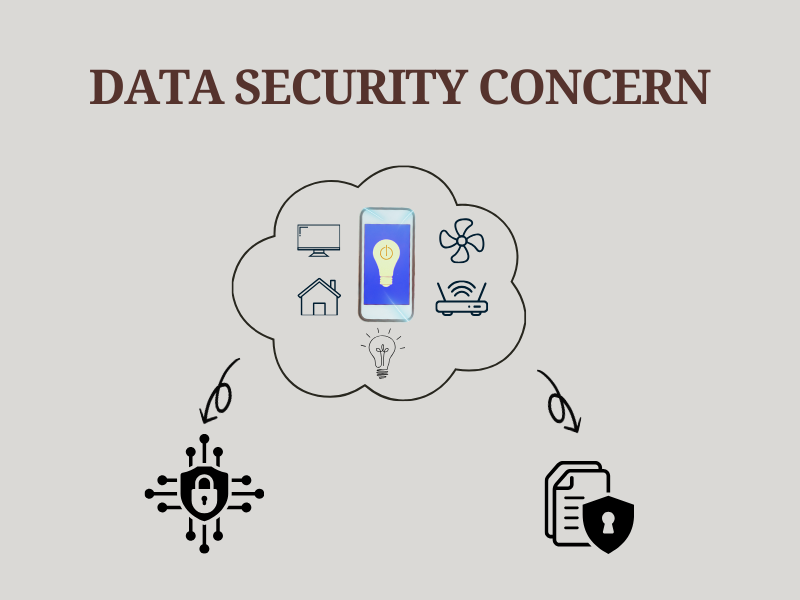
What are The Data Security Concerns with Smart Outdoor Lights and Are There Any Privacy Risks?
While outdoor smart lights offer many benefits, they also raise some concerns regarding data security and privacy such as:
- Smart lights may collect data such as your location, usage patterns, and energy consumption. This data could be potentially used for targeted advertising or other purposes.
- Like any connected device, smart lights can be vulnerable to hacking. If compromised, hackers could potentially control your lights, access your network, or even use them as part of a larger attack.
- Some people may be concerned about the potential for their outdoor lighting habits to be monitored or used for surveillance purposes.
To minimize these risks, it’s important to take the following steps:
- Opt for well-known brands with a strong track record in security.
- Create complex and unique passwords for your smart home devices and networks.
- Regularly update the firmware of your smart lights and other connected devices to address security vulnerabilities.
- Consider creating a separate network for your smart home devices to isolate them from your main network.
- Review the privacy policies of smart light manufacturers and understand how your data is collected and used.
Are Smart Outdoor Lights Weatherproof and Can They Withstand Harsh Conditions?
It’s important to choose lights with a high IP rating to ensure they’re suitable for outdoor use. Additionally, some brands offer additional weatherproofing features like sealed housings or UV protection to further enhance their durability.
When choosing outdoor smart lights, weatherproofing is a crucial factor to consider. Exposure to rain, snow, humidity, and extreme temperatures can significantly impact the lifespan and performance of these devices.
By prioritizing weatherproofing and selecting lights with appropriate IP ratings, you can ensure that your smart outdoor lights will withstand the elements and provide reliable performance for years to come.
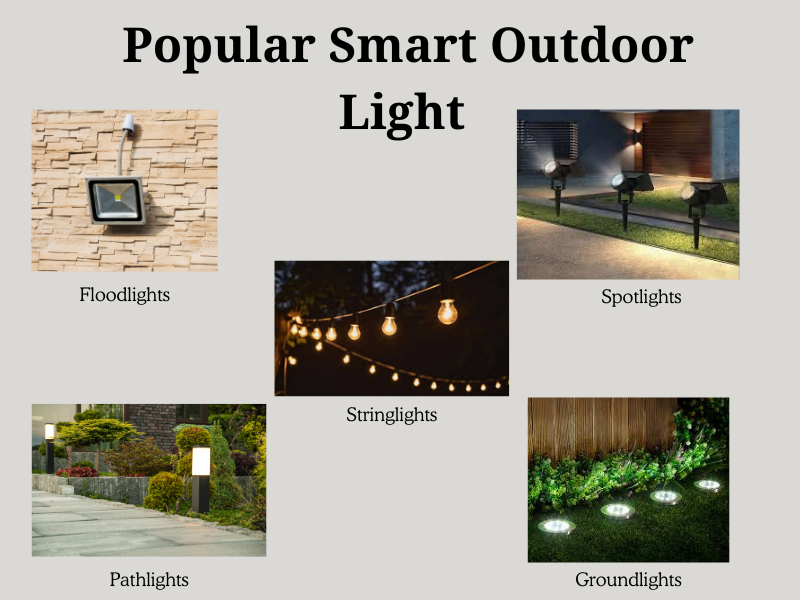
Best Outdoor Smart Light Categories
Outdoor smart lights come in various categories, each designed to meet specific needs and preferences. Here are some of the most popular options:
- Floodlights: These powerful lights are ideal for illuminating large areas, such as driveways, patios, or security perimeters.
- Path lights: Designed to illuminate pathways and walkways, path lights offer a safe and stylish lighting solution.
- String lights: Versatile and decorative, string lights can be used to create a festive atmosphere or provide ambient lighting.
- Spotlights: Perfect for highlighting specific features or architectural elements, spotlights offer focused illumination.
- Ground lights: These low-profile lights are ideal for creating ambient lighting and illuminating pathways or gardens.
When choosing the best category for your outdoor space, consider factors such as the desired level of brightness, the area you want to illuminate, and the overall aesthetic you’re trying to achieve.
What are The Most Popular and Reliable Brands of Smart Outdoor Lights?
Here are some of the most popular and reliable brands of smart outdoor lights in the USA:
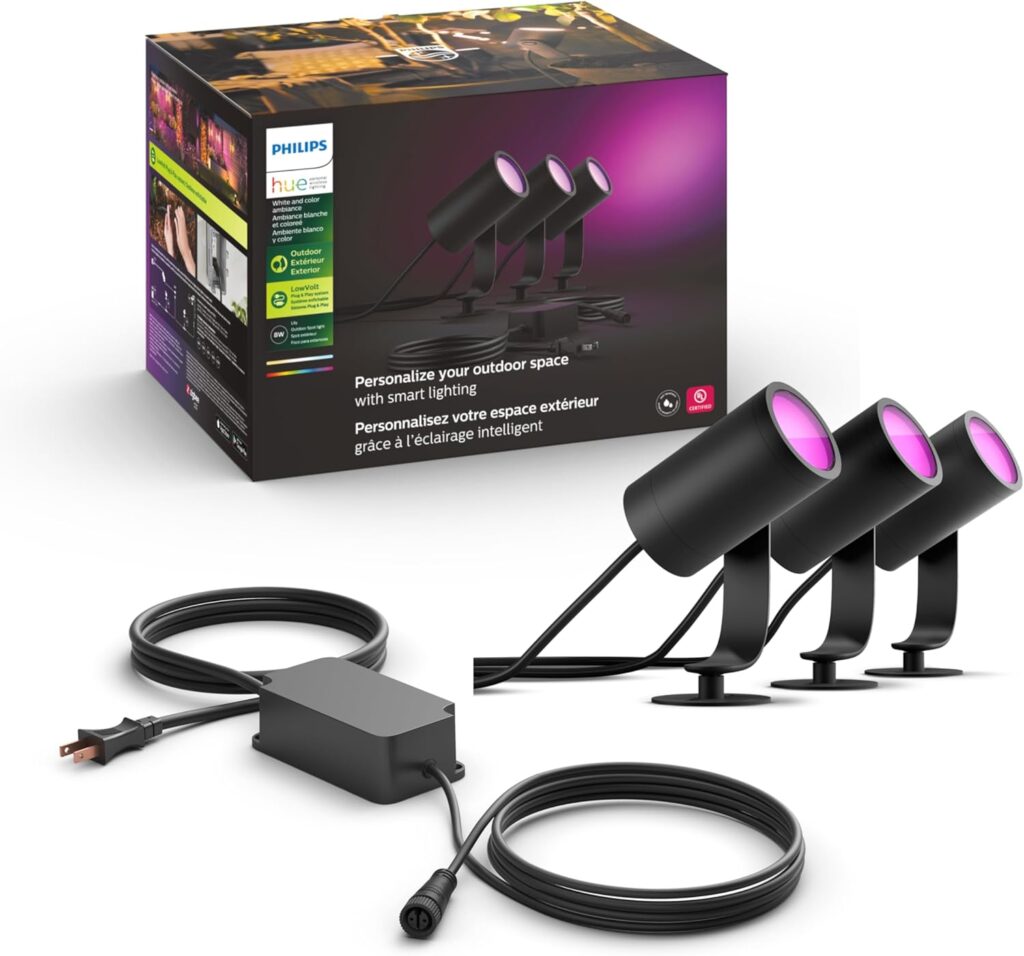
Philips Hue
Feature
- Renowned for its wide range of products and excellent color customization options
- Wide color range
- IP44 weatherproofing
- Integration with Hue Bridge
- Compatible with Amazon Alexa, Google Assistant, Apple HomeKit
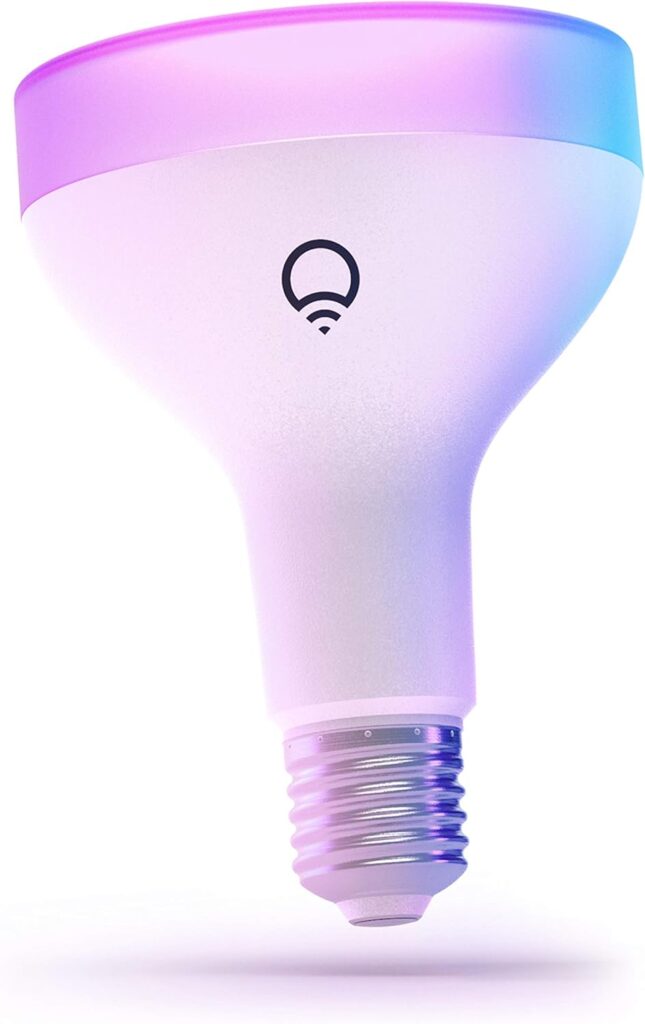
LIFX
Feature
- Offers durable and versatile outdoor lighting solutions with a focus on color-changing capabilities
- Multi color options
- IP65 weatherproofing
- Compatible with Amazon Alexa, Google Assistant, Apple HomeKit
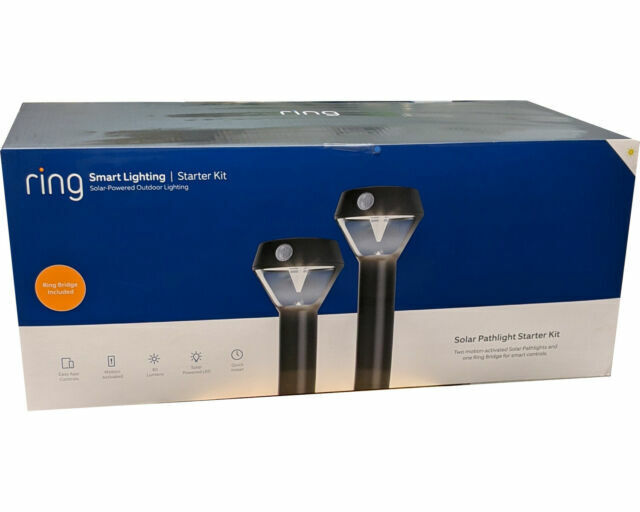
RING
Feature
- Known for its home security products
- Offers a range of outdoor smart lights with integrated security features
- Integrated cameras
- Motion detection
- Two-way audio
- Compatible with Amazon Alexa, Google Assistant, Apple HomeKit
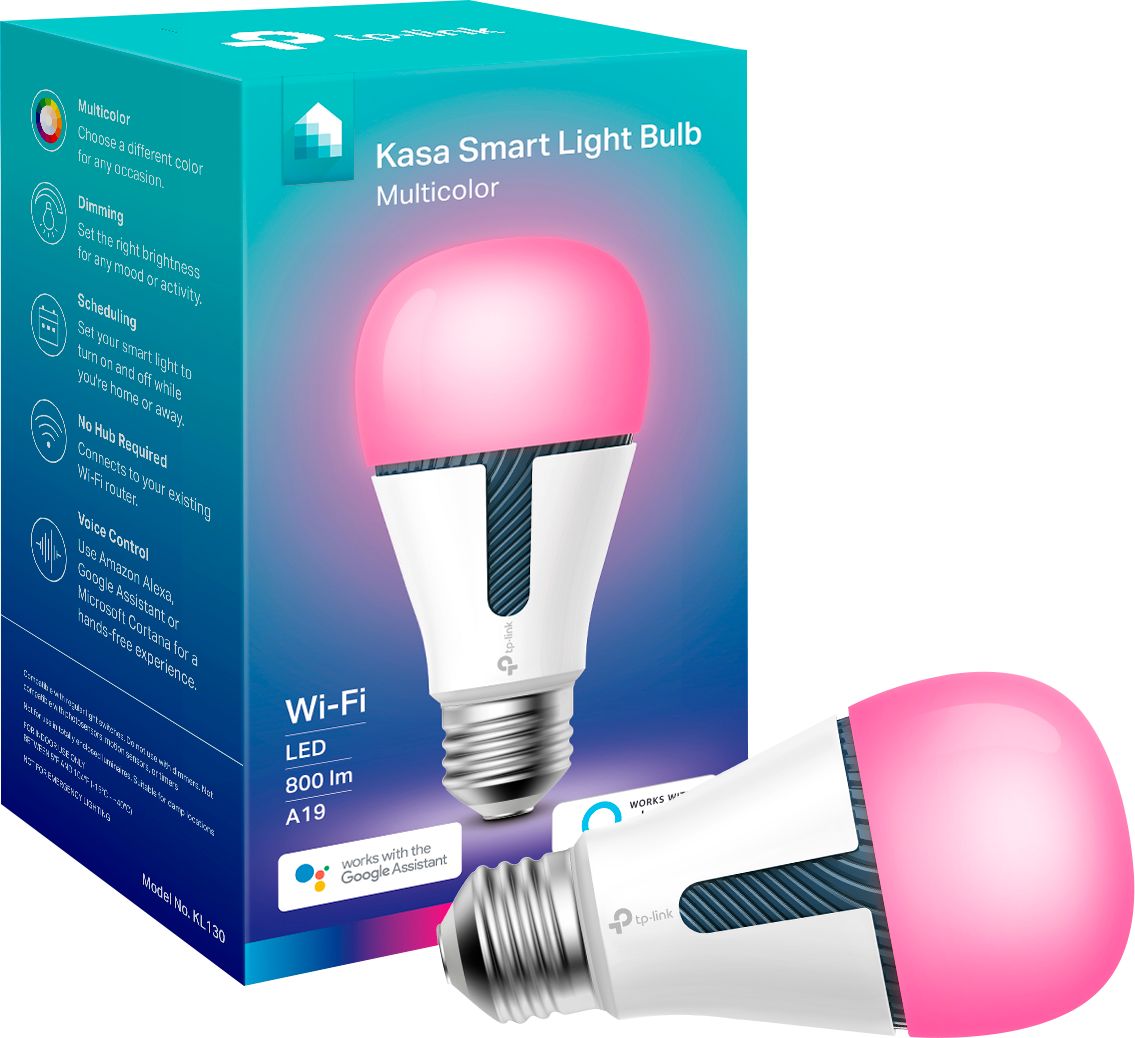
TP-LINK
Feature
- Provides affordable and reliable outdoor smart lighting options with easy setup
- IP65 weatherproofing
- Easy setup
- Compatible with Amazon Alexa, Google Assistant
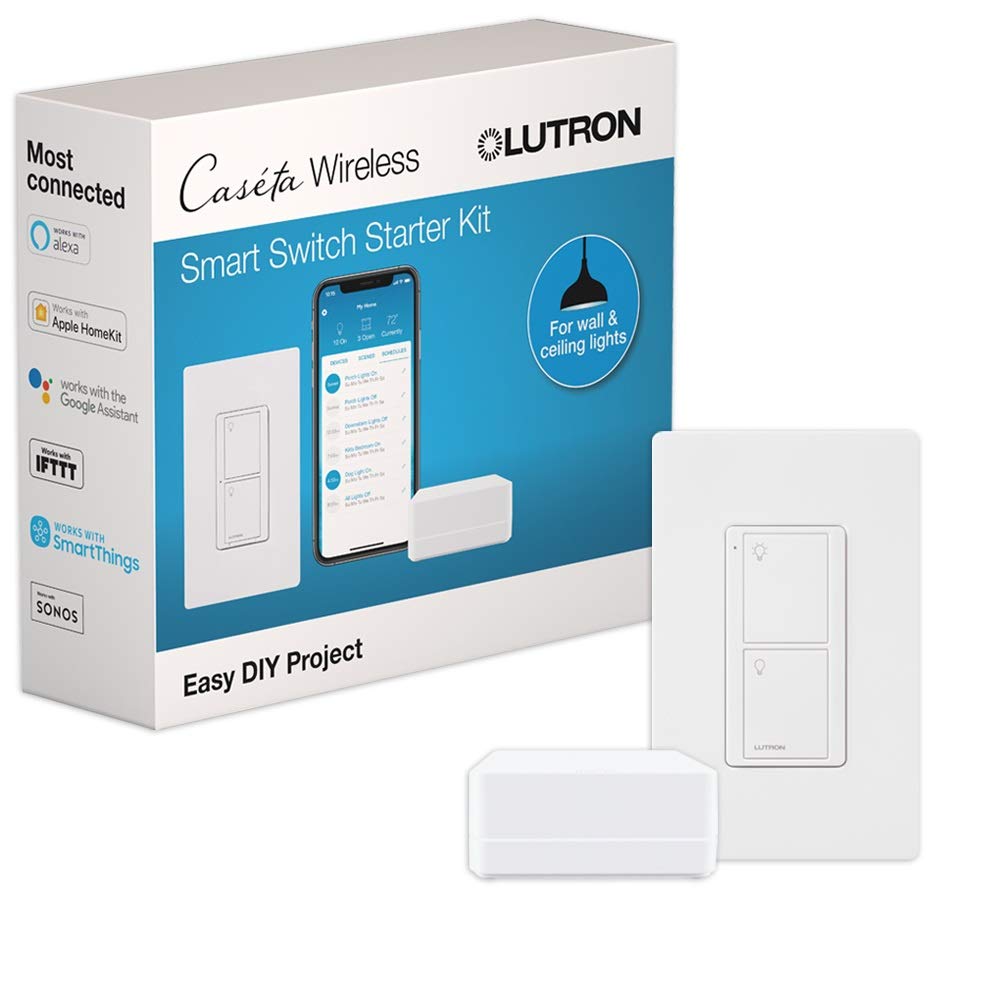
LUTRON
Feature
- Known for its high-quality indoor lighting solutions, Lutron has expanded into outdoor smart lighting
- Dimming capabilities
- Color-changing options
- Integration with other Lutron products
- Compatible with Amazon Alexa, Google Assistant, Apple HomeKit
Note: The popularity and reliability of brands can change over time. It’s always a good idea to research the latest reviews and customer feedback before making a purchase. It’s important to note that the best brand for you may depend on your specific needs, budget, and preferences. Consider factors such as compatibility with your smart home platform, desired features, and customer reviews when making your decision.
What is The Typical Price Range for High-Quality Smart Outdoor Lights?
The typical price range for high-quality smart outdoor lights in the USA can vary depending on factors such as brand, features, and quantity.
The price for single lights can range from $50 to $200 or more, depending on the brand and features. Multi-light kits of two or more lights can cost anywhere from $100 to $500 or more. Meanwhile for high-powered floodlights can cost upwards of $150 to $300 or more.
It’s important to note that prices can fluctuate, and there may be sales or promotions available. Additionally, some brands offer more affordable options without compromising on quality.
| Brand | Price Range | Key Features | Compatibility |
| Philips Hue | $50-$200 | Wide color range, IP65 weatherproofing, integration with Hue Bridge | Amazon Alexa, Google Assistant, Apple HomeKit |
| LIFX | $50-$200 | Color-changing, IP67 weatherproofing, multi-color options | Amazon Alexa, Google Assistant, Apple HomeKit |
| Ring | $50-$200 | Integrated cameras, motion detection, two-way audio | Amazon Alexa, Google Assistant, Apple HomeKit |
| TP-Link | $30-$100 | Affordable, IP65 weatherproofing, easy setup | Amazon Alexa, Google Assistant |
| Eufy | $50-$150 | Battery-powered options, IP65 weatherproofing, long-lasting battery | Amazon Alexa, Google Assistant, Apple HomeKit |
| Lutron | $50-$200 | Dimming capabilities, color-changing options, integration with other Lutron products | Amazon Alexa, Google Assistant, Apple HomeKit |
The best outdoor smart light is not just a mere bulb or fixture; it is a gateway to a world of possibilities. With its ability to seamlessly integrate with our daily lives, outdoor smart lighting has the power to transform our homes and communities.
Imagine stepping into your backyard and being greeted by the warm glow of the best outdoor string lights. These enchanting lights create a magical ambiance, turning any ordinary evening into a memorable experience. Whether you’re hosting a dinner party or simply enjoying a quiet moment under the stars, these lights add a touch of elegance and charm to your outdoor space.
But outdoor smart lighting goes beyond aesthetics. It also enhances safety and security. The best outdoor light for the front of your house illuminates your path, ensuring you and your loved ones feel safe and secure at all times. With motion sensors and programmable settings, these lights can deter intruders and provide peace of mind.
And let’s not forget about energy efficiency. The best outdoor LED lights for your house not only reduce your carbon footprint but also save you money in the long run. With their long lifespan and low energy consumption, these lights are an investment in both the environment and your wallet.
By embracing smart lighting solutions, we are not only illuminating our world but also embracing a more sustainable future. The possibilities are endless – from controlling your outdoor lights with a simple voice command to creating personalized lighting scenes for every occasion.
So, let us step into this brighter, smarter future together. Let us illuminate our world with the best outdoor smart light, outdoor smart light bulb, best outdoor string lights, best outdoor light for the front of the house, and the best outdoor LED lights for our houses. Let us inspire others to explore and embrace smart lighting solutions, creating a ripple effect that will lead to a more connected and enlightened world.
Together, we can illuminate our world, smarter.




